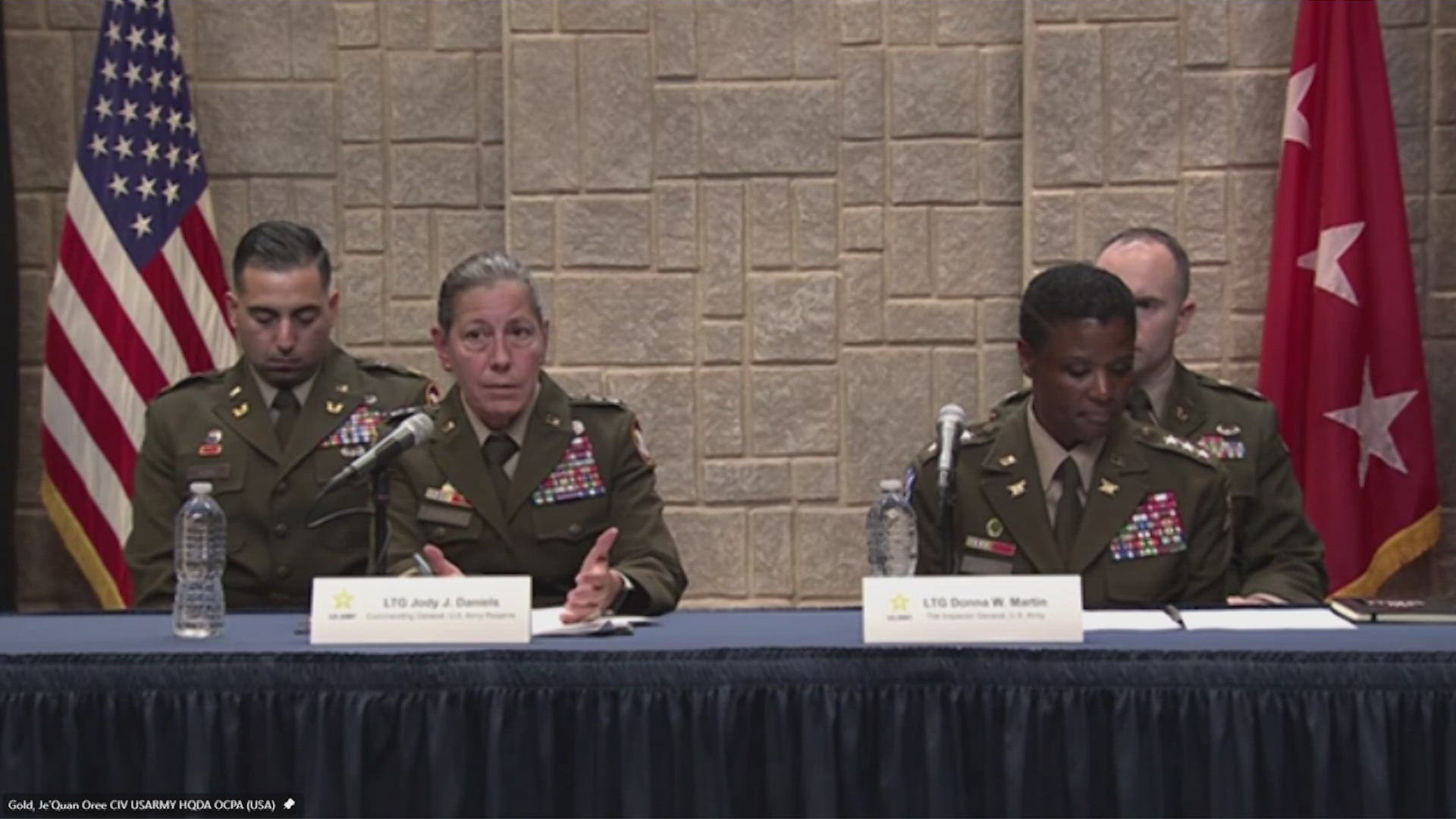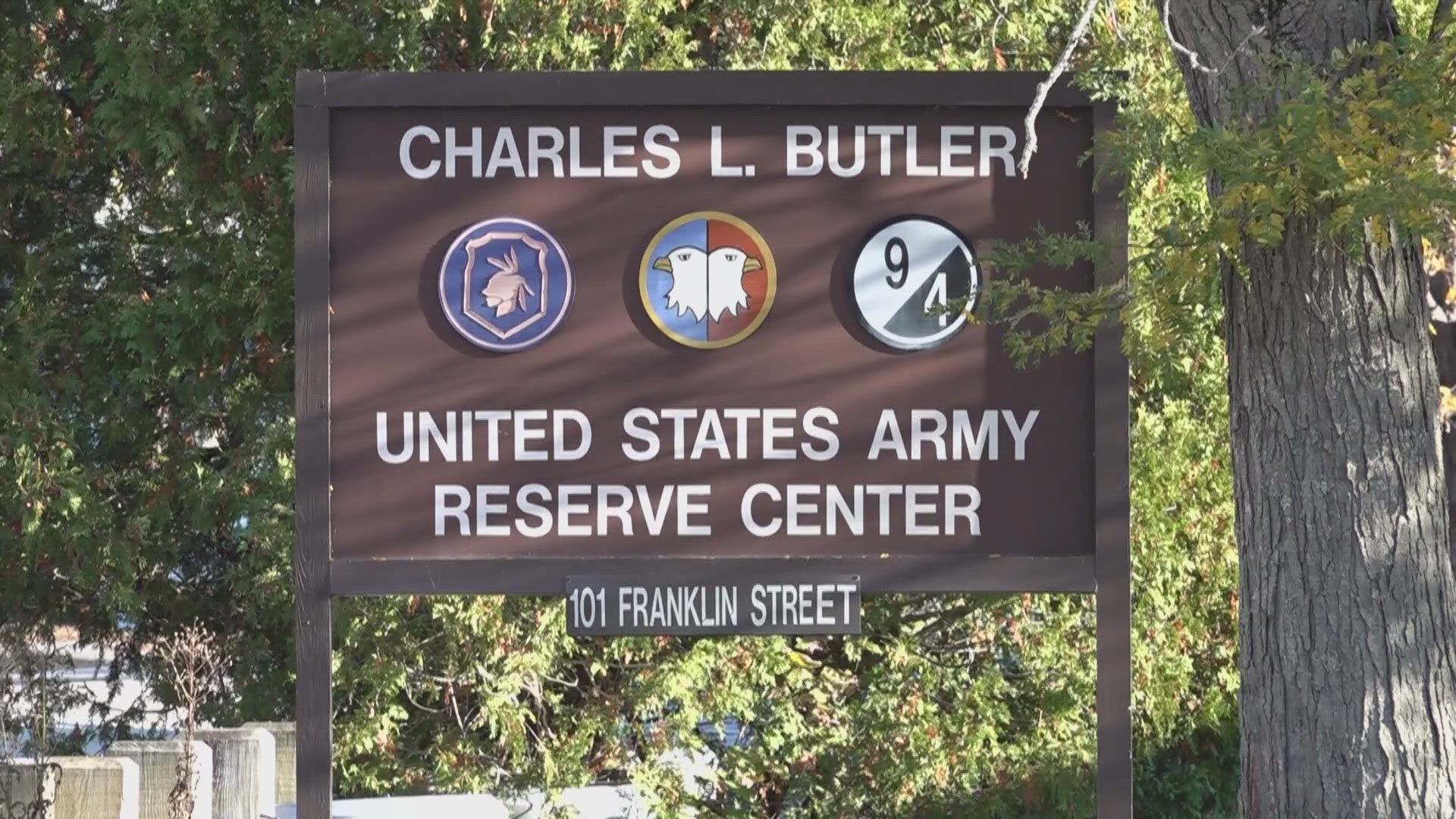LEWISTON, Maine — The U.S. Army released its report detailing what an investigator found about how Robert Card's mental decline was documented and treated before the mass shooting in Lewiston in October of 2023.
The Army made its report public on Tuesday. Chief of Army Reserve Lt. Gen. Jody J. Daniels and Inspector General of the U.S. Army Lt. Gen. Donna W. Martin both fielded questions from the media on Monday.
The report, which Daniels said was completed in late June 2024, redacts most of the names of the people directly involved.
The report found that Card's chain of command and the medical providers treating Card in July of 2023 failed to adequately communicate concerns to all parties regarding Card's "homicidal ideations" and their concerns that Card's military and personal weapons should be taken away.
BEFORE THE SHOOTING
In July 2023, Card reported to his annual training event at West Point, where his fellow unit members said he displayed troubling signs of mental instability.
Card was quickly ordered to complete a command-directed behavioral health evaluation at the Keller Army Community Hospital at West Point. That evaluation identified the need for more advanced follow-up care because of apparent "homicidal ideations."
On July 16, Card was transferred to Four Winds Hospital, a civilian facility in Katonah, New York. The report said Card received in-patient care for 19 days between July 16 and Aug. 3, 2023.
While there, Card's behavioral health evaluation was completed. Army medical staff placed Card on a 90-day behavioral health profile, which restricted his access to military-issued weapons. Medical professionals at Four Winds staff recommended that his chain of command remain engaged in his care and that "measures be taken to safely remove all firearms and weapons from SFC Card's home of record."
Card had asked to be released from Four Winds, which triggered a New York state law to schedule a court hearing. Card later rescinded his request, and the hearing was canceled.
"Four Winds Hospital nevertheless released SFC Card on August 3rd, to a Soldier and friend from his unit. This investigation was unable to determine the reason for SFC Card's release due to the hospital staff declining to speak with the investigating officer," the report found.
The report also said Four Winds staff rated Card "a very low risk" of committing harm against himself or others.
WHO DROPPED THE BALL
This investigation was unable to determine the reason for SFC Card's release from Four Winds due to the hospital staff declining to speak with the investigating officer. The report does not say why that hearing was canceled.
"A preponderance of the evidence shows SFC Card was not properly released from his orders. Because SFC Card was hospitalized for over 24 hours during his service on active duty, SFC Card’s unit should have initiated a Line of Duty Investigation (LODI) while SFC Card was still in the hospital or immediately after his discharge," the investigator wrote.
According to the report, Card's chain of command never received Card's discharge summary from Four Winds Hospital, even though it was uploaded to the military medical system. The report also stated that "if it had been provided to the chain of command would have detailed the extent of SFC Card's mental health issues."
Card should have been returned to the Army hospital rather than released of his own accord, the report stated.
"A preponderance of the evidence shows SFC Card was improperly released from his active-duty orders," the investigator wrote. “The facts surrounding SFC Card's discharge are suspect.”
Army leaders said Card's chain of command did not remain involved in his care and that staff at Four Winds failed to appropriately notify those unit members.
"On the surface, SFC Card was permitted to leave the hospital and may have had information on what to do next," the Army investigator wrote. "The documents I received as part of my investigation show none of these items were completed until four to eight days after SFC Card was already released. However, I defer to Walter Reed to opine on whether it is customary or within the standard of care for a patient to receive unsigned discharge instructions."
The investigator also found Card’s chain of command did not pursue a line-of-duty investigation, or LODI, which laws said they should have performed because SFC Card was hospitalized for more than 24 hours during his service on active duty during his hospitalization.
On top of that, the investigator said LODIs must be conducted when an injury, illness, or death occurs under strange or doubtful circumstances or when a member of the USAR becomes disabled because of that injury, illness, or death, which the investigator believes was applicable in Card’s case.
The report determined that Card's chain of command incorrectly assumed they could not access any of Card's health information because of HIPAA.
"The chain of command was aware of the threats, and they referred the threat in September 2023 to local law enforcement in the form of letter to the Sagadahoc County Sheriff's Office," the investigator wrote. "The chain of command did not confer with PHP, which would have revealed SFC Card was noncompliant with pursuing treatment or available resources."
Daniels responded to questioning about whether anyone from the military communicated these concerns to local law enforcement.
"The Army had contact with family members, and there was a miscommunication as to who was removing weapons, who had possession of weapons, but there were multiple instances of conveyances by Army Reserve personnel to recommend that those weapons be stored outside of SFC Card's care," Daniels said. "I have to check the record to see if that was requested of local law enforcement."
The investigator also placed blame on Sagadahoc County Sheriff’s Office deputies.
“I find by a preponderance of the evidence that if Sagadahoc County Sheriff's Office (SCSO) had fully executed their health and welfare check on SFC Card in September 2023, then the mass shooting and suicide may have been avoided,” the investigator wrote.
“Maine law enforcement's failure to take substantive action on [redacted] report was unreasonable,” the investigator wrote.
The investigator also said the Keller Army hospital staff, Army Reserve Medical Management Command, also are culpable.
The investigator recommended changes to Army procedures regarding soldiers’ mental health follow-up care: “[The SOP] does not sufficiently support effective communication nor provide adequate emphasis to a Soldier's command leadership.”
RECOMMENDATIONS
“Overall, SFC Card's unit was in the difficult position of having no authority over a non-cooperative Soldier,” the investigator wrote. “The unit was under the impression that SFC Card was acting strangely, but medical professionals had determined that SFC Card was a ‘very low risk’ of harm to himself or others.”
The investigator said unit personnel took “prudent” actions based on the information available at the time: “When information came to the unit's attention that indicated immediate action needed to be taken, members of the unit reached out to local law enforcement with all the information they had to try to get the entity with actual jurisdiction to handle the problems identified.”
The Army said it has disciplined three military staff in ways that could preclude them from further serving in the military.
“I recommend the Defense Health Administration consider removing Four Winds as an authorized treatment facility,” because of how hospital staff handled Card’s discharge, the report proposed.
NEWS CENTER Maine reached out to Four Winds Hospital for comment but had not heard back by the time the embargo had lifted.
Daniels said the Army cannot compel the Four Winds staff to cooperate with the investigation but did not disclose a reason why.
Army leaders have not heard yet whether the Army would continue using Four Winds or Spectrum Service Group, which it contracts for medical services.



